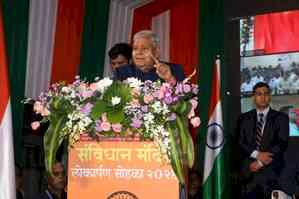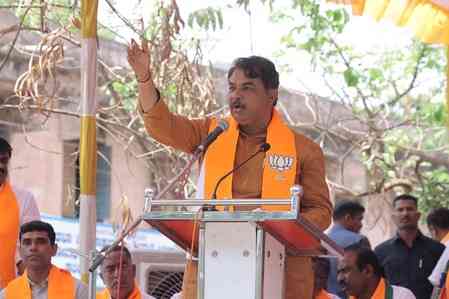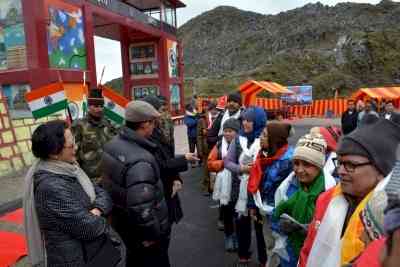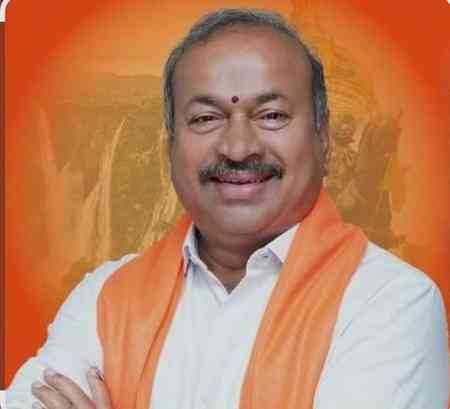Reservation is conscience of our Constitution: Jagdeep Dhankar
Vice President Jagdeep Dhankhar said on Sunday that the reservation is the conscience of the Constitution and also questioned the mindset of people who denied the conferment of Bharat Ratna to Babasaheb Ambedkar and the implementation of Mandal Commission.

Mumbai, Sep 15 (IANS) Vice President Jagdeep Dhankhar said on Sunday that the reservation is the conscience of the Constitution and also questioned the mindset of people who denied the conferment of Bharat Ratna to Babasaheb Ambedkar and the implementation of Mandal Commission.
Criticising those who talk of ending reservation and think that it is against meritocracy, the Vice President underlined: “Let me assure you, reservation is the conscience of the Constitution, reservation is in our Constitution with positivity, with great meaning to bring about social equality and to cut inequities. Reservation is affirmative action, it is not negative. Reservation is not depriving someone of opportunity, reservation is hand holding those who are pillars and strength of society.”
He said that a pattern of prejudice against reservation has been handed over and a person holding a constitutional position who is making serialised periodic ‘anti-India rant’ on foreign soil is talking about ending reservations.
“The frontal attack on the democratic constitutional values must be rebuffed,” the Vice President said while speaking at the inauguration of Samvidhan Mandir (Constitution Temple) at Elphinstone Technical High School & Junior College in Mumbai.
Criticising the flaunting of Constitution by some, Dhankhar said that: “Constitution is not to be flaunted like a book. The Constitution has to be respected. The Constitution has to be read. The Constitution has to be understood. Merely presenting the Constitution as a book, showcasing it - at least any civilised, knowledgeable person, someone with a devoted spirit towards the Constitution, and one who reveres the essence of the Constitution - will not accept it.”
Dhankhar stated: “It is a matter of concern, a subject for reflection, and a topic for deep contemplation! The same mindset that was anti-reservation, the pattern of prejudice against reservation that has been handed over. Today, a person sitting in a constitutional position says abroad that reservations should be abolished.”
“Why the true gem (Babasaheb Ambedkar) was not awarded Bharat Ratna. It was awarded on March 31, 1990. Why was this honour not given earlier? Baba Saheb was very well-known as the architect of the Constitution. Another significant issue related to Babasaheb's mindset is the Mandal Commission report. After this report was presented, for the next ten years, and during that decade when the country had two Prime Ministers - Indira Gandhi and Rajiv Gandhi - not a single move was made regarding this report,” he added.
Dhankar said that India’s first Prime Minister Pandit Nehru had the anti reservation mindset. He quoted Nehru who said, “I do not like reservations in any form. Especially reservations in jobs. I am against any step that promotes inefficiency and takes us towards mediocrity.”
Asking the young generation to be mindful and aware of the 21 months of Emergency, the darkest period in the history of post Independent India, he remarked, “Never forget a particular day; always remember it. It is a black day, a stain on our history. June 25, 1975, is the darkest chapter of our journey post-independence, the darkest period of our democracy.”
“We celebrate Constitution Day to remind ourselves how our Constitution was created, how it establishes our rights, how it empowers us, and how it creates a system where a person from an ordinary background can become Prime Minister, a farmer’s son can become Vice President, and a tribal woman of great calibre and elegance, who has seen all the shortcomings and ground realities, can become President,” he said.
Reflecting on the need for separation of power among different organs of the state and need for all the organs to work within their limitations thus avoid becoming trigger point of political inflammatory debate, Dhankhar stated: “All organs of the state - judiciary, legislature, and executive - have a single purpose: to ensure the success of the fundamental spirit of the Constitution, to guarantee all rights to the common people, and to help India prosper and flourish.”
--IANS
sj/dan


 IANS
IANS 










